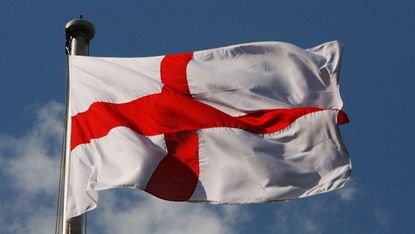What is St George’s Day?
Celebrations for England’s legendary dragon slayer are normally a subdued affair

St George’s Day, a celebration of the patron saint day of England, takes place today, amid the UK’s continuing coronavirus lockdown measures.
The Telegraph reports that the day is “recognised annually on the anniversary of St George’s death” and was “previously a national holiday and was once celebrated as widely as Christmas”.
But even without a major global pandemic keeping Britons indoors, celebrations in the modern era are usually highly subdued - particularly compared to commemorations of Ireland’s patron saint, Patrick.
Subscribe to The Week
Escape your echo chamber. Get the facts behind the news, plus analysis from multiple perspectives.

Sign up for The Week's Free Newsletters
From our morning news briefing to a weekly Good News Newsletter, get the best of The Week delivered directly to your inbox.
From our morning news briefing to a weekly Good News Newsletter, get the best of The Week delivered directly to your inbox.
So what does St George’s Day celebrate - and why is it so rarely observed in England?
When is St George’s Day?
St George’s Day is on 23 April, but it is not a national holiday in England – unlike St Patrick’s Day in Ireland. The date was set by the Council of Oxford in 1222.
Who was St George?
Not much is known about St George, except that he wasn’t an Englishman. Historians believe he was born in Cappadocia, a part of modern Turkey, into a noble Christian family in the third century, and followed in his father’s footsteps by joining the Roman army, the BBC says.
Tradition suggests that when Emperor Diocletian ordered the systematic persecution of Christians, George refused to take part and was tortured and ultimately executed in Palestine. His method of torture “apparently included laceration of wheel of swords before he was eventually decapitated”, The Independent says, but before he was killed he donated all of his wealth to the poor.
George was later recognised as an early Christian martyr. The legend of St George, clad in armour, slaying a dragon and rescuing a maiden, was a medieval invention.
Why is he associated with England?
According to historian Michael Collins, one of the earliest known British references to St George appears in an account by St Adamnan, the seventh-century Abbot of Iona who heard about St George from a French bishop named Arcuif. But his reputation began to grow only when returning crusaders said the saint had made a miraculous appearance and led them into battle at the siege of Antioch in 1098. They also passed on the legend of St George’s dragon slaying to the royal court.
When King Edward III founded the Order of the Garter in around 1348, he placed it under St George’s patronage, and at about the same time English soldiers were required to wear “a signe of Saint George” on their uniforms. St George appears in Shakespeare’s version of King Henry V’s rousing address to his troops before the Battle of Agincourt: “Cry ‘God for Harry, England, and Saint George’.”
Other countries celebrating St George include Bosnia and Herzegovina, Bulgaria, Canada, Croatia, Cyprus, Georgia, Greece, Macedonia, Romania and Serbia.
Why are celebrations in England so muted?
For many in England, St George’s Day is rarely met with anything more than a shrug, if it’s even noticed at all.
A series of events usually take place across the country to commemorate England’s patron saint, including markets, festivals and feasts.
But public enthusiasm for the day has never truly taken off, in stark contrast to Ireland’s St Patrick’s Day, which is celebrated worldwide from Dublin to the Caribbean.
As The i notes, bans on public gatherings and closed pubs will mean “this year’s celebrations will be much more low-key, and limited to people’s homes”.
Historian Diarmaid Macculloch tells the Huffington Post that English apathy towards St George’s Day may be a consequence of the reformation. “The English, being Protestants for nearly five centuries, have never had much time for saints’ days – same with the Scots,” Macculloch said. “Neither really need their patron saints to celebrate nationhood.”
But others draw a distinction between St George and other patron saints of the British Isles. “St Andrew’s and St Patrick’s Day celebrations reflect the assertion of an identity distinct from the dominant English identity,” says Robert Ford, a lecturer in politics at the University of Manchester. “It is not clear whom the English define themselves against, or in comparison to.”
Research carried out in 2013 by the think tank British Future suggested that many English people are “nervous” about celebrating St George’s Day. The poll, published by the Daily Telegraph, found that many English people are concerned that national symbols like the St George’s Cross flag may be interpreted as racist.
Create an account with the same email registered to your subscription to unlock access.
Sign up for Today's Best Articles in your inbox
A free daily email with the biggest news stories of the day – and the best features from TheWeek.com
-
 Shardlake: a 'tightly plotted, gorgeously atmospheric piece of television'
Shardlake: a 'tightly plotted, gorgeously atmospheric piece of television'The Week Recommends Arthur Hughes captivates in this 'eminently watchable' Tudor murder mystery
By Irenie Forshaw, The Week UK Published
-
 Major League Baseball is facing an epidemic of pitcher's injuries
Major League Baseball is facing an epidemic of pitcher's injuriesUnder the Radar Many insiders are blaming the pitch clock for the rise in injuries — but the league is not so sure
By Justin Klawans, The Week US Published
-
 8 movie musicals that prove the screen can share the stage
8 movie musicals that prove the screen can share the stageThe Week Recommends The singing and dancing, bigger than life itself
By Scott Hocker, The Week US Published
-
 Breathtaking: the Covid drama that may make you scream
Breathtaking: the Covid drama that may make you screamThe Week Recommends ITV three-parter is a 'tour de force' that exposes 'political complacency'
By Chas Newkey-Burden, The Week UK Published
-
 The lasting changes of the post-pandemic dining era
The lasting changes of the post-pandemic dining eraThe Explainer The newest of new normals
By Scott Hocker, The Week US Published
-
 How revenge travel is impacting the aviation and tourism industries
How revenge travel is impacting the aviation and tourism industriesTalking Point The surge in travel is a far cry from the previous pandemic years during which travel took a hit
By Devika Rao Published
-
 Virgin Atlantic fined for violating Iraqi airspace
Virgin Atlantic fined for violating Iraqi airspaceSpeed Read Airline said the incursions were accidental and caused by the Covid-19 pandemic
By Chas Newkey-Burden Published
-
 Love Actually and our ‘endless nostalgia loop’
Love Actually and our ‘endless nostalgia loop’Talking Point Reunions and reboots provided comfort during Covid but is it wise to keep looking back?
By Chas Newkey-Burden Published
-
 Japan opens border for tourism after almost 3 years of COVID restrictions
Japan opens border for tourism after almost 3 years of COVID restrictionsSpeed Read
By Devika Rao Published
-
 Hong Kong announces relaxed quarantine policy for incoming travelers
Hong Kong announces relaxed quarantine policy for incoming travelersSpeed Read
By Theara Coleman Published
-
 U.S. to end COVID test requirement for international travelers
U.S. to end COVID test requirement for international travelersSpeed Read
By Brigid Kennedy Published